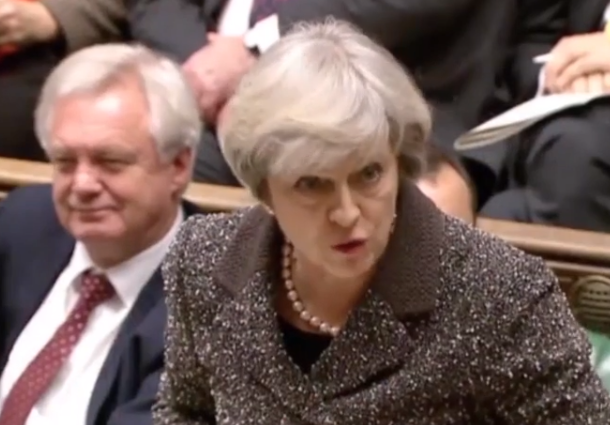Theresa May's response to Trump's torture policy is depressing, but not surprising
We need a leader like Corbyn who can stand up to the President. Instead May gave a worrying lacklustre response to Trump's plans to support torture and breach basic human rights


Your support helps us to tell the story
From reproductive rights to climate change to Big Tech, The Independent is on the ground when the story is developing. Whether it's investigating the financials of Elon Musk's pro-Trump PAC or producing our latest documentary, 'The A Word', which shines a light on the American women fighting for reproductive rights, we know how important it is to parse out the facts from the messaging.
At such a critical moment in US history, we need reporters on the ground. Your donation allows us to keep sending journalists to speak to both sides of the story.
The Independent is trusted by Americans across the entire political spectrum. And unlike many other quality news outlets, we choose not to lock Americans out of our reporting and analysis with paywalls. We believe quality journalism should be available to everyone, paid for by those who can afford it.
Your support makes all the difference.Spare a thought for writers of fiction in this new world of "alternative facts". Many of the real political events of the last year would probably have been laughed out of any publishing house or movie studio just a few months before. "Donald Trump is the President..." You can almost imagine the words coming from one of those cinema ads for a mobile phone provider that pastiche people pitching film scripts in Hollywood. But it really happened and if we as the "junior" partner in the special relationship don't step up to this new and grotesque challenge, the joke will be on us and millions of people around the world.
We all remember that moment in the 2003 Richard Curtis's hit Love Actually when a young British Prime Minister (Hugh Grant) stands up to an arrogant and sleazy US President caricatured by Billy Bob Thornton. The speech given to Grant was perhaps a little sentimental for some but it was nonetheless powerful and true. "We may be a small country, but we're a great one too ... and a friend who bullies us is no longer a friend. And since bullies only respond to strength, from now onward, I will be prepared to be much stronger." The contrast with Theresa May's unfortunate "opposites attract" remarks as she flew to the United States could not be greater.
"Dawn breaks on a new era of American renewal..." She told a Republican retreat in Philadelphia. I imagined Dawn as one of the millions of women insulted by the election and repeated misogynistic outbursts of the 45th "Leader of the Free World". There is not much comfort, dignity or freedom for women in President Trump's programme for Government, nor sadly in our Prime Minister's response to his elevation. It is as if she thought the symbolism of a woman visiting Washington is enough. Sure enough there was much talk of "liberty, freedom and the rights of man" but little detail just days after Trump attacked that American holy of holies that is journalistic freedom in the wake of less than glowing reports of the attendance at his inauguration. But most worrying of all — given the nature of Britain's intelligence and security "relationship" with the US — is May's timidity on torture.
Trump has repeatedly during and since his campaign spoken of reinstating waterboarding and "a hell of a lot worse". Given an all too recent history of British complicity and involvement in US rendition and torture practice during the war on terror, the Prime Minister's "We do not sanction torture and we do not get involved in it" is simply not good enough. President Trump does not need or seek her "sanction" for torture or anything else and "getting involved" is a suitably vague term in any activity or relationship, special or not. She should have confronted his remarks and intentions head on, made clear that the alliance between our two countries has to be based on shared values and that the barbarity of Daesh cannot be defeated by descending into barbarity ourselves.
Further, it is hard to imagine how the integrity of British intelligence services and personnel could be protected if they — subject to the ethical and legal standards of international and domestic human rights law — must work in close cooperation with US public servants licensed to "fight fire with fire" in Trump's new Wild West where the sheriffs of the world include his new friend Mr Putin. The President must be warned that far from improving security, his rhetoric and apparent intentions constitute a grave threat to it.
Mrs May's ambivalence on fundamental rights and freedoms is nothing new. The clues lie in her six years as Home Secretary when she repeatedly displayed a taste for populist attacks on human rights that make her less a Trump "opposite" than might first seem apparent. There was the farce of "catgate" in 2011. An apocryphal reference to feline impediments to deportation lit up her tub-thumping conference speech. But it necessitated correction by her Cabinet colleague and then Justice Secretary Ken Clarke and even a rare press release by the Judiciary itself.
Then there was the Abu Qatada affair. It was greatly to May's credit that in 2013 she achieved a goal that had eluded so many of her predecessors in the possibility of a lawful and human rights' compliant deportation of the ranty cleric to his home country of Jordan. The obstacle had been the practice of torture in that kingdom and the admissibility of torture evidence in trials there.
Theresa May negotiated anti-torture amendments to the Jordanian constitution and could have claimed a victory for human rights at home and internationally. Instead she grasped a moral defeat from the jaws of victory, criticising the Court of Human Rights and entrenching her opposition to our Human Rights Act and European Convention on Human Rights. Now from the vantage point of Number 10 and the world stage, these two documents are firmly in her sights for destruction.
The contrast with Labour couldn't be clearer. Jeremy Corbyn has a lifetime commitment to Human Rights protections and against abuses of which torture is the most grave. Strong women with strong human rights credentials occupy Foreign and Home Affairs and Defence roles in his top team. The Labour leadership’s position is unequivocal, torture is, “inhumane, illegal and delivers false intelligence.” By these values do we uphold our gravely threatened democracies.
Join our commenting forum
Join thought-provoking conversations, follow other Independent readers and see their replies
Comments